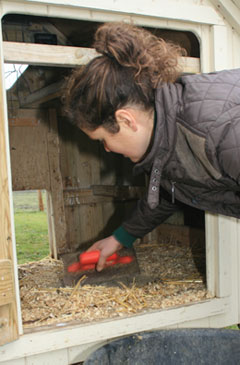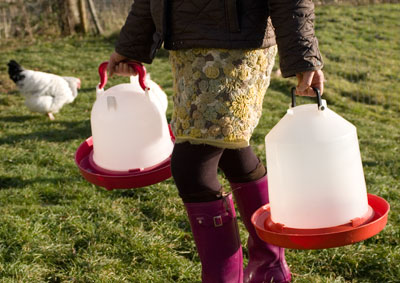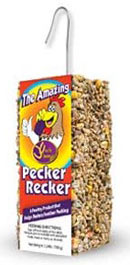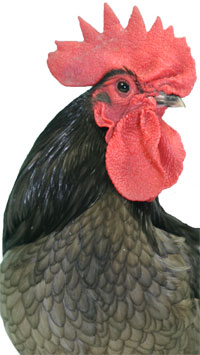Stress is a major contributor to ill health in chickens and can also make them more prone to a number of vices such as feather picking, egg eating, comb or vent pecking.
Chickens kept in intensive conditions are constantly subjected to stress which is why farmers see such high mortality rates and have to pay out to keep birds healthy and make them productive. Fortunately, keeping chickens in our back garden isn’t exactly intensive as long as they have a sufficiently large run or are let out of their run regularly to free-range although there are pleanty of other times when chickens can suffer from stress.
In short, stress is best avoided whenever possible and a little bit of care and forethought can dramatically reduce stress in your birds.
So how do we know what stresses chickens? Well, some years ago, there were studies done that measured the stress hormone ‘corticosterone’ of birds in different situations and it is this research that has enabled us to understand the stressors.
Stressors.
As well as intensive conditions causing stress, the other main stressors can seem quite trivial to us.
- Handling. This is one of the biggest stressors. Chickens are a prey species so naturally, if caught and picked up, they become stressed. Whilst regular handling is important for health checks, chasing a bird around a run for 5 minutes every time will not help. Try to catch birds in a confined area such as a house quickly and calmly. Hold the wings firmly and then transfer the bird to the holding position with your right hand underneath her, breast in the palm of your hand, fingers holding the tops of the legs. Her head should be underneath your arm so her head is looking behind you. Use your left hand to examine her.
- Introducing new chickens. Chickens are flock animals that have a pecking order. It is thought the ancestors to our chickens, the Red Jungle Fowl of South East Asia use the pecking order to assist in their survival. If every bird has her place, when it comes to feeding time, each one can have her turn and they don’t have to spend precious time arguing which may alert predators to their where-abouts. Every hen knows her place in the pecking order and by introducing new birds, the pecking order is upset. No hen knows where she stands and this will cause arguments and considerable stress for days until they have sorted themselves out into a ‘new flock’.
- Lack of food or water. This stress is completely avoidable of course but we all have those one off days when we suddenly realise that our birds have run out of water for one reason or another. A leaky water container, frozen water or just a forgetful moment!
- Extreme heat. Chickens don’t sweat. To cool down, a chicken must either take on cool water (and excrete more to lose the excess fluids and some heat) or pant which removes heat through the air they exhale. Chickens are much better equipped to deal with the cold and can keep their body temperature up by eating more and trapping air inside their feathers to insulate themselves thermally. Heat will cause chickens to become stressed.
- A new environment. This can be taking a bird to a show, getting your birds for the first time or just moving them to a different house or run. Another environmental change that is hard to avoid but causes considerable stress for your birds is when there has been a covering of snow.
- Egg laying. This is surprising since this is a natural things that chickens do but egg laying does cause stress on your hens. Giving them a peaceful, private, darkened nest box can help. Try not to disturb hens that are in the process of laying.
- Predation. Foxes or other predators visiting the garden on a regular basis are likely to cause stress. In the extreme case, after a fox attack, even though a chicken may survive the wounds inflicted by a fox (he grabs a mouth full of her feathers for example and the chicken escapes), she can still die because of the stress.

If you can minimise stress, your birds will be less prone to picking up disease which is something we would all like: happy, healthy chickens!






have just got three chickens they all have been laying, now one stays in the coop all day and is not laying.
She doesn’t sound well. Look for obvious signs but you may need to take her to your vet.
im on an allotment and another allotment holder keeps emptying her dirty duck pond and the water flows into my pen and my chickens keep drinking it and walking in it and it smell horrid due to duck excrement this CAN’T be healthy one ex bird of mine i gave away six weeks ago now has vent gleet is this due to that contaminated water as the duck owner insists because chickens scavenge all day the water is harmless im a novice i keep all utensils clean everyday am i weakening there immune system by to much hygeine so there more suseptible when faced with bacteria in water i thought water must remain clean with utensils
You are right, she shouldn’t do that. Chickens will drink from dirty water but this is to be avoided because it is full of bacteria and can cause disease. Mud is also bad news as worms and eggs will become prolific in muddy damp ground.
Hi,
We had two 10 month old chickens. A Buff Orpington and a Rhode Island red. We had them since chicks. Yesterday the Buff Orpington died, she had seemed well (eating / running etc) recently but had appeared to be broody for a few days over the weekend and had subsequently stopped laying and her comb had become a little paler… we thought this was all secondary to the broodyness she had exhibited. We found her dead in her dust bath. Very Sad.
Now the Rhode Island was fine yesterday but since removing the Buff she has become really quiet and withdrawn and not laying eggs, she eats and drinks but is not interested in much, now she is sitting up on her perch in the hutch…. if i look in on her she stands up and seems alert but she is not her usual michevious self at all.
This all seems to have started after the Buff Orpington died, is she just lonely and pining? Can that happen? We want to get a couple more chickens to get back to 3 chickens but don’t want to get them incase chickens don’t pine/mourn and the Rhode Island is infact ill.
She sounds ill although they do need company as they are flock animals so it could be she is feeling lonely.
I would worm her (if she hasn’t been wormed recently) and then give her some ACV in the water and make sure she has a good diet, then after keeping an eye on her for a week or two, if she doesn’t show further signs of illness, get some more chickens.
We bought 6 hens 3 months ago and they have been laying 3 to 4 eggs a day all eating and drinking well. however 2 weeks ago we found one dead in the coup in the morning with no sign of injury and this morning another on was dead on the floor of the coup. They are free range in the day, we don’t know what we can have done wrong as we have read up about food and mites etc. has anyone had this happen?
There could unfortunately be any number of reasons for this. The most likely is red mite or worms but there are other diseases that can kill them suddenly. It is unusual and it might be worth getting a PM done if there are any more deaths in your flock.
Hi had to have my xbattery chicken put to sleep as she has been ill for a week and i had to hand feed and water her, this morning she just could not walk and had lost a lot of weight, im down to one chicken, will my other chicken be ok as im worried she will pine for her, the one left was the lead chicken, also im having 5 more chickens next week, how do i go about putting her with them now she is on her own.
Chickens are flock animals, it is kinder to keep them in a small flock so you are doing the right thing. Introductions are best done where there is some wire between the two and they can feed near one another but only squabble with the fence between them. Once they seem happy after a couple of days, remove the fence but allow lots of space to free range so they can get away. At night, if one can’t roost in the house due to bullying, wait until it is dark and then pop her on the perch near the others. Make sure you are around to let them out when it gets light.
Thank you for your advise, and for all the other ones i have asked.